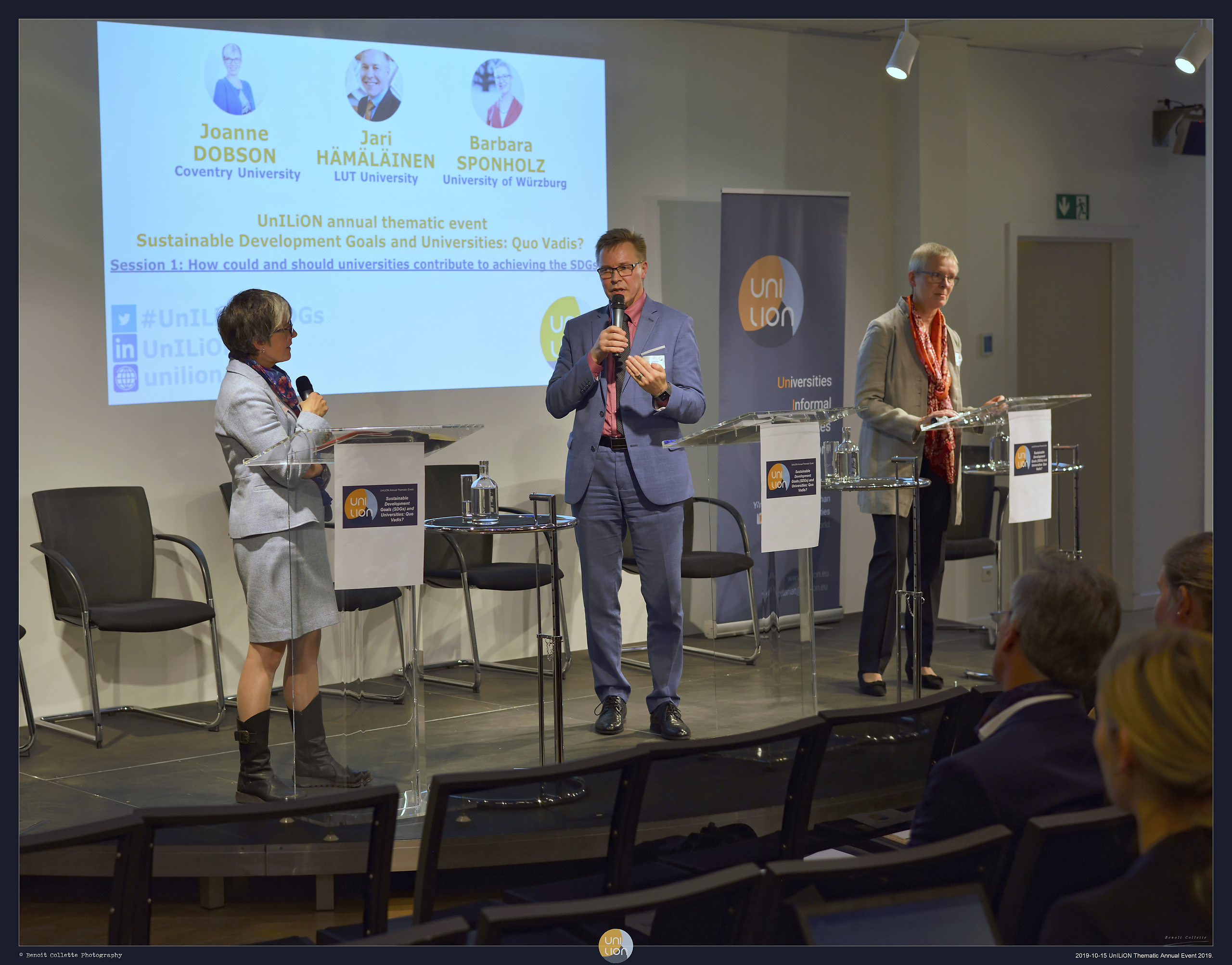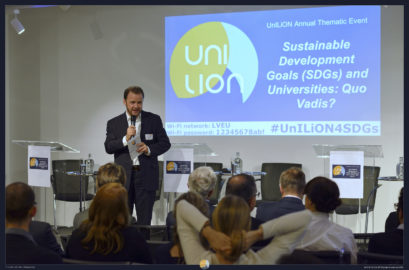What do the United Nations Sustainable Development Goals (SDGs) mean for universities, and how can universities be key partners in delivering the SDGs?
On 15 October UnILiON hosted an event on the role that higher education institutions should play for the achievement of Sustainable Development Goals (SDGs). In the age when world dynamics are changing, the need for sustainable development is more relevant than ever. Consensus has formed around the idea that institutions should be integrating SDGs into a strategy rather than addressing it as a separate issue. Some progress has already been made with the Times Higher Education introducing impact rankings, however, there are doubts over the visibility of those rankings. Consequently, a transdisciplinary approach is needed, with sustainable development being integrated at an early stage. Ultimately, a consensus was reached that universities are society’s role models for sustainable development.
“How could and should universities contribute to achieving SDGs?”
After introductory words by UnILiON Secretary Massimo Busuoli, the first session, a panel debate with UnILiON members Barbara Sponholz VP of the University of Würzburg, Joanne Dobson Pro-VC Coventry University, Jari Hämäläinen VP LUT University, was chaired by Simon Pickard, Network Director at Science|Business.
For universities to be contributing to SDGs it is necessary to integrate them into university strategies rather than treating SDGs as a separate issue. Some universities have already integrated SDGs into their overall strategic direction while others have not heard about it. The Times Higher Education have introduced impact ratings, however there are doubts with regard to the visibility of these rankings. The Catholic University of Eichstätt-Ingolstadt has introduced a sustainability campus and the KU Leuven was recognised by UNESCO as an outstanding place of learning for sustainable development in 2016.
The debate continued over the question whether scientific freedom and autonomy is compatible with SDGs and subsequently consensus was reached that this should not be an obstacle. A multidisciplinary approach is needed and hence support from university leadership. Speakers agreed that SDGs should not be a taboo topic and that transdisciplinary centres are key.
Furthermore, speakers found that it is necessary to point out that SDGs should not be treated as a stand-alone project; sustainable development should be integrated at an early stage, trans-disciplinary action is needed. An example was made of Coventry University, where they introduced a 10 credit module and Curriculum 2025 is to feature SDGs. Barbara Sponholz highlighted the importance of a teacher education programme which already has a focus on sustainability. However, Joanne Dobson disputed that this programme should not be exclusive only to teachers OR students. She then acknowledged that student demands are changing due to culture and thus expectations from the students are changing.
The panel came to the conclusion that universities must be role models for SDGs and have a public audience and a media presence. They need to engage with society on many different levels; in the UK it is the civic university commission. Furthermore, exchange and coordination of information is crucial to this process. Joanne Dobson took an example of her university; Coventry University has signed the University and College SDG Accord that is UN supported, sharing and reporting into the UN Forum. However, it is necessary to stress the fact that progress always starts at the individual level, even though money is always a good way to attract alliances.
How should EU policies evolve to integrate universities as an actor for the SDG-related activities?
This second session, which was also chaired by Simon Pickard, included the following speakers: Angelika Niebler (MEP), Veronika Hunt Šafránková (Head of Brussels Office, UN Environment), Patrick Child (Deputy Director-General Research and Innovation European Commission), Carlotta Besozzi (Coordinator, Civil Society Europe) and Roberto Zoboli (Rector’s Delegate for Research, Università Cattolica del Sacro Cuore).
The European Parliament perspective centred around the idea that when discussing SDGs it is necessary to consider the bigger picture, sustainability is at the centre of debates on environment and social rights. Part of the global sustainability challenges is how much funding should be set aside for innovation. It is difficult to convince member states to increasing EU funding, particularly when innovation/research funds are always most subjected to cuts. Patrick Child discussed Europe’s goal of full decarbonisation by 2020, which is a strong feature of the Green Deal. Furthermore, there is a growing emphasis on co-creation and co-design within Horizon Europe, setting long-term impact targets.
The panel then moved on to discussing the importance of citizens. Civil Society Europe (CSE) is valuable in order to provide stronger recognition of the role of citizens. CSE also made a call to involve students to be a part of the mission boards, as CSE felt that current board members are not very representative. Power of the youth and grassroots opinion must be heard and thus allowing for meaningful research engagement, CSE said. It was also pointed out that there is a real gap in involving civil society groups and that a further push for monitoring consultation is necessary. The fostering of discussions between universities and NGOs is necessary to the process and hence the proposition of open universities was discussed. The idea of co-creation requires a change of attitude, coming up with new ideas, not just scrapping old proposals.
Ultimately, collective action is the cornerstone to addressing global sustainability challenges. There is a need for multilateralism and information sharing between actors at different levels. The European Union forms an integral role for SDG related activities, the Paris Agreement would not have been made possible without it.
Download the programme of the event (PDF, 774 kB)
Event details
- Tuesday 15 October 2019
- 17.00 – 21.00
- Representation of the State of North-Rhine Westphalia to the European Union, Rue Montoyerstraat 47, Brussels
The UnILiON organisation team consists of these offices:
- Aix-Marseille Université
- Bavarian Research Alliance Brussels Office
- Bristol & Bath Brussels Office
- European Office of Cyprus
- London Higher Europe
- Lärosäten Syd – Universities in South Sweden
- Maastricht University Campus Brussels
- Norwegian University of Science and Technology Brussels Office (NTNU)
- Università Cattolica del Sacro Cuore
- University of Bari Aldo Moro
- University of Birmingham
- University of Eastern Finland
- Vrije Universiteit Brussel European Liaison Office
- White Rose Brussels


